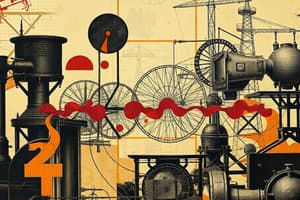Podcast
Questions and Answers
What is a heat engine primarily designed to do?
What is a heat engine primarily designed to do?
- Convert thermal energy into mechanical work (correct)
- Generate heat through exothermic reactions
- Cool down the surroundings
- Convert mechanical energy into thermal energy
Which property is associated with the degree of disorder or randomness in a system?
Which property is associated with the degree of disorder or randomness in a system?
- Pressure
- Entropy (correct)
- Enthalpy
- Temperature
What happens to entropy when part of a system becomes more disordered?
What happens to entropy when part of a system becomes more disordered?
- Entropy decreases
- Entropy becomes negative
- Entropy increases (correct)
- Entropy remains constant
What does an adiabatic process involve?
What does an adiabatic process involve?
How can enthalpy be defined?
How can enthalpy be defined?
In a heat engine, what provides the working substance with energy?
In a heat engine, what provides the working substance with energy?
What is the fundamental principle established by the first law of thermodynamics?
What is the fundamental principle established by the first law of thermodynamics?
Which law of thermodynamics defines entropy as a measure of disorder in a system?
Which law of thermodynamics defines entropy as a measure of disorder in a system?
What type of process occurs at constant temperature?
What type of process occurs at constant temperature?
Which law of thermodynamics establishes that the entropy of an isolated system cannot decrease over time?
Which law of thermodynamics establishes that the entropy of an isolated system cannot decrease over time?
What is the condition for an isothermal process?
What is the condition for an isothermal process?
Which type of process involves no heat transfer and no work being done by the system?
Which type of process involves no heat transfer and no work being done by the system?
Flashcards are hidden until you start studying
Study Notes
Thermodynamics
Thermodynamics is a branch of physics that deals with the relationship between heat, work, and energy. It focuses on how energy moves between systems, usually between substances that are in contact with each other. The most fundamental laws of thermodynamics establish constraints on the energy transfer and transformations within isolated systems. These principles govern both the natural world and human creations such as engines and refrigerators.
Laws of Thermodynamics
There are four main laws of thermodynamics:
Zeroth law: If two systems are each in thermal equilibrium with a third system, they are also in thermal equilibrium with each other.
First law: This law establishes the principle of conservation of energy. Energy cannot be created or destroyed, only transferred from one place to another or transformed into different forms.
Second law: Also known as the law of entropy, it states that under the assumption of no external work being done by the system, the total entropy of an isolated system cannot decrease over time. Entropy is a measure of disorder in a system.
Third law: This law defines the entropy of a perfect crystal (a system of atoms vibrating in a regular lattice) at absolute zero temperature as being exactly zero.
Thermodynamic Processes
Thermodynamics can be applied to different types of processes, such as:
Isothermal process: A thermodynamic process that occurs at constant temperature.
Adiabatic process: A thermodynamic process in which there is no heat exchange with the environment.
Heat Engines
A heat engine is a device that converts thermal energy into mechanical work. The most common example of this is a steam engine, which uses energy from burning coal to produce motion. There are two essential parts to any heat engine: a source of heat that provides the working substance with energy, and a mechanism for doing work on the surroundings.
Entropy
Entropy is a property related to the degree of disorder or randomness in a system. It is often used to describe systems with many particles interacting with each other. When something changes, and part of it becomes more disordered, then entropy has increased. For example, when you mix hot water with cold water, the overall temperature goes down but the heat spread out so it got dispersed over larger volume of mixture, resulting in an increase in entropy.
Enthalpy
Enthalpy is a thermodynamic potential that measures the maximum reversible work that can be done by a system at constant temperature and pressure. It is given by the sum of product of partial pressures and their respective entropies or molar volumes: H = pV = TΔS.
Studying That Suits You
Use AI to generate personalized quizzes and flashcards to suit your learning preferences.




